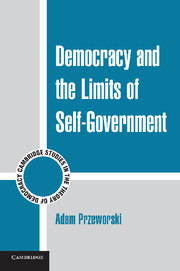Book contents
1 - Introduction
Published online by Cambridge University Press: 05 June 2012
Summary
INTRODUCTION
The representative institutions under which we live today evolved from a revolutionary idea that shook the world in the second part of the eighteenth century, namely, that a people should govern itself. Only when equal citizens determine the laws under which they live are they free. Furthermore, liberty was the ultimate political value, “everything,” as many said. Yet if we judge contemporary democracies by the ideals of self-government, equality, and liberty, we find that democracy is not what it was dreamt to be. Could it have been? If it could have been, can we better implement these ideals today? These are the questions that motivate and structure what follows.
We tend to confuse the ideals of founders for a description of really existing institutions. This ideological veil deforms our understanding and our evaluations. It is politically pernicious because it simultaneously feeds unreasonable hopes, including quite a few hallucinatory projects, and blinds us to feasible reforms. Hence, my intent is to demystify, to free our understanding of real democracies from the perspective of their origins.
“Democracy,” with all its changing meanings, has recurrently confronted four challenges that continue to feed widespread and intense dissatisfaction today. These are (1) the incapacity to generate equality in the socioeconomic realm, (2) the incapacity to make people feel that their political participation is effective, (3) the incapacity to ensure that governments do what they are supposed to do and not do what they are not mandated to do, and (4) the incapacity to balance order and noninterference.
- Type
- Chapter
- Information
- Democracy and the Limits of Self-Government , pp. 1 - 16Publisher: Cambridge University PressPrint publication year: 2010

